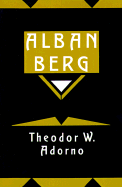A note on the translation
Published online by Cambridge University Press: 03 May 2011
Summary
Translating Adorno is a notoriously daunting task. His use of language is brilliant and idiosyncratic, drawing liberally upon a knowledge of French, English, Latin, and Greek to infuse each word with radical meaning. His argumentation is a curious mixture of close reasoning and intuitive insight, critical perspicacity and capricious self-indulgence. At times one wishes he had had the services of a ruthless editor, and, as translator, one is tempted to intervene in ways ranging from breaking up sentences and paragraphs to searching for a more straightforward vocabulary. On the whole, we have resisted the temptation, in part so as not to misrepresent the difficulty of Adorno's prose – which he intended – and in part because his Berg study, though containing its fair share of puzzles, is not among his most recondite books. Indeed, its warm personal tone lends it an almost lyrical quality, especially in the passages of reminiscence.
Adorno is generally quite precise in his terminology. Therefore, context permitting, we have tried to be consistent in our translation of key terms, such as Modell (paradigm), Rest (remnant), retten (to salvage), and Vermittlung (mediation). Translating such key words is not always easy, and one of the most vexing terms appears in the very title of the book, Meister des kleinsten Übergangs. While one might normally translate Übergang as “transition”, we felt that this word, with its emphasis on process, missed the essentially neutral quality of what Adorno sees as the Bergian Übergang, which need be no more than a single tone.
- Type
- Chapter
- Information
- Alban BergMaster of the Smallest Link, pp. xv - xviPublisher: Cambridge University PressPrint publication year: 1991



